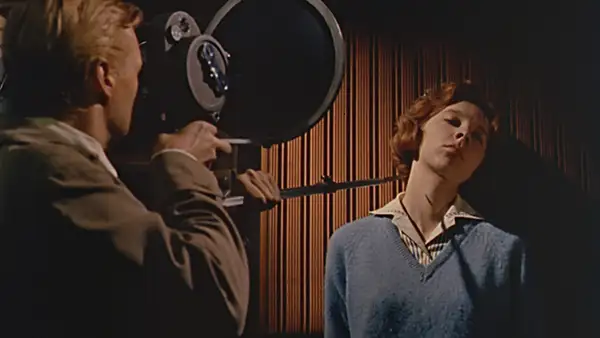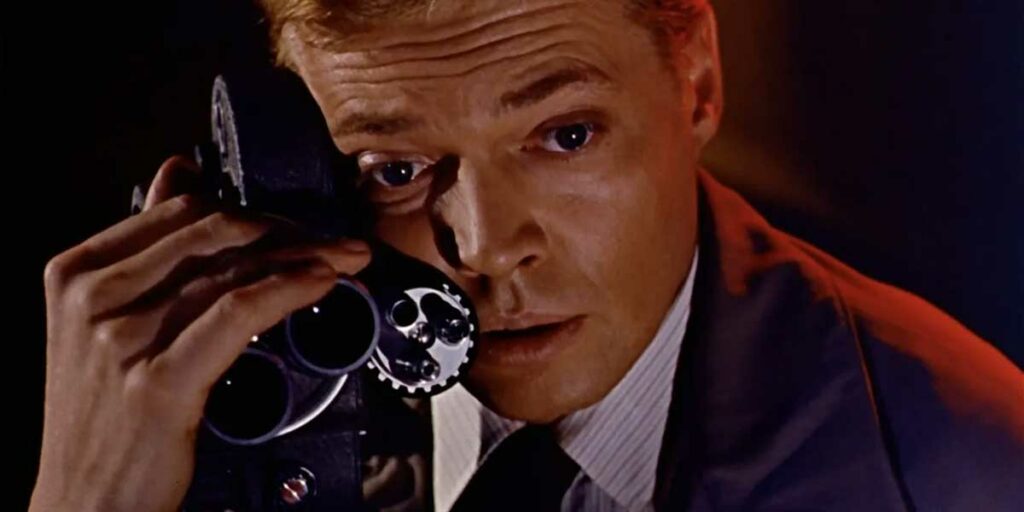Michael Powell’s Peeping Tom stands the test of time, over 60 years since its initial release, in this disturbing portrait of a sympathetic serial killer.
Perhaps the most remarkable aspect of Michael Powell’s Peeping Tom, over 60 years after its initial release, is how unremarkable it is. This is, however, not a slight against the film but an appraisal of its modernity. Powell’s most notable film away from his long time collaborator and friend Emeric Pressburger is more akin to the films of the generation below him who, in 1960, were changing the landscape of British cinema with their neo-realist kitchen sink dramas. These films do not feel dated due to a realism and truth that separates them from the dreck that the stagnant Hollywood was producing at the time. Peeping Tom’s modernity was so progressive it shocked British critics into a reactionary daze, where their outrage led to the film flopping and subsequently helped end Powell’s career. Thematically and visually, it was a precursor for the next 60 years of thrillers.
Peeping Tom follows the murderous escapades of our disturbed protagonist, Mark Lewis (Karlheinz Böhm), as he parades around London killing young women while filming the look on their faces when they die. The set-up and rough plot synopsis of the film would lead anyone to believe that they’re watching one of cinema’s most despicable protagonists, but instead the viewer becomes gradually sympathetic with this celluloid loving creep. The viewer’s empathy for Mark owes a debt to both his upbringing, as a scientific guinea pig for his father’s psychological experiments, and meeting Helen Stephens (Anna Massey), the woman who he falls for. As Mark and Helen’s awkward romance progresses the more you learn about the horror of Mark’s past and how he became the person he is today.
It’s an odd feeling to feel empathetic towards such a murderous and off putting character, but Powell, and writer Leo Marks, manage to weave in the trauma of Mark’s past alongside revealing the person he could be if he had been loved, by quite literally anyone. The affection he shows to Helen is one of bewilderment for him but, nevertheless, he begins a sweet, almost innocent relationship with Helen, who rents the flat below him. He is shocked by the affection and attention Helen gives and is soon dining out with her and helping her photograph a children’s book she has written. These scenes are a stark contrast to the luridness of Mark’s voyeuristic murders, which are often framed so the viewer is staring down the lens of Mark’s camera. But they are essential in humanising Mark, offering an alternate perspective from his inhumane murders.
The understanding of Mark’s tortured mind comes through home movies made by his father where you begin to see the experiments played on young Mark (played by Powell’s own son) and also how he found his love for filming and the power of a moving image. All the empathy conjured for Mark is why the film still feels so modern. Watching it in 2023 situates it with films such as Joker or even the films in the Saw franchise, where traditionally villainous characters are given a reason for their perversion. But Peeping Tom was released in 1960, where the trauma backstory of villains certainly wasn’t de rigueur or even acceptable by the press or public.

Another notable release in 1960 was Alfred Hitchcock’s Psycho, another dark, bloody, perverse slasher tracking the murderous exploits of a young man tormented by a twisted past. Despite Psycho also receiving some snooty reviews at its release, it was deemed a box office smash and ensured Hitchcock many more years of Hollywood demand. So, with the similarities of both films, why did Psycho solidify Hitchcock’s legendary status but Peeping Tom set Powell’s career to flames?
It is down to what society could or could not deal with back in 1960. While Psycho is shocking and bloody in its own right, with its motel setting and multiple personality antagonist, it almost detaches itself from the reality of the regular lives of the movie going public. The likelihood you’ll steal some money from work, stay at a spooky motel and then meet Norman Bates is unlikely. But Mark from Peeping Tom looks like an ordinary man, who lives in an ordinary flat, who for the most part lives a quiet life in London. It’s the unremarkable nature of Mark and the on-location London setting that ups the verisimilitude, that British critics found so appalling 60 years ago.
This verisimilitude includes Peeping Tom holding a mirror up to society, and bluntly suggesting British society wasn’t as far away from Mark as they liked to think so. In an early scene in a newsagents a rather Hitchcockian looking older gentleman, comes in to buy some “views”, aka nude photos, under the guise of buying The Times and The Telegraph papers. The older gentleman is repressed and embarrassed but the shop owner is clearly prepared for this situation, with paper bags labelled ‘Educational Books’ at the ready, to conceal any unwanted public glances at the tawdry pictures. It highlights this is no one off, and while this man’s desire isn’t in the same category as Mark’s; Peeping Tom evinces British society isn’t as innocent as tea and scones, in spite of the want of the era’s film critics.
Peeping Tom works so effectively today due to its essence of modernity and verisimilitude. Powell’s film doesn’t look modern, some of the characterisation is outdated (Helen’s blind Mother feels particularly antiquated) and the violence can no longer really shock a 21st century audience; but the film’s power lays with Mark as the ne plus ultra example of a sympathetic villain. This is what keeps Peeping Tom fresh, Mark is the 1960’s equivalent to an incel. It is more than conceivable that a person like Mark is living alone in a flat in London right now and is capable of such atrocities. Peeping Tom is surprisingly prescient — filmically and culturally. It is the urtext of the Joker style of sympathetic murderers, and also an anticipatory study of incel culture. Peeping Tom may have prematurely ended Powell’s career, but its influence is remarkable.
Peeping Tom is now available to watch on digital and on demand, and remastered on Blu-Ray.

